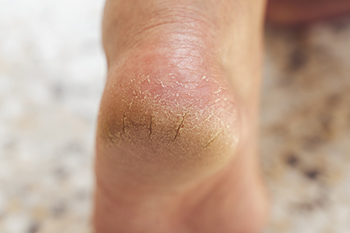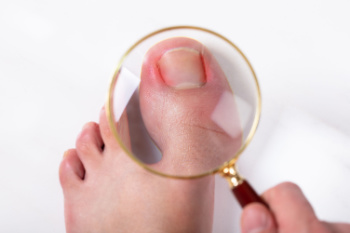Connect With Us
Blog
Items filtered by date: January 2025
Causes and Risk Factors for Cracked Heels

Cracked heels, also known as heel fissures, are a common foot condition where the skin on the heels becomes dry, thickened, and cracked. This condition often causes pain and discomfort, especially when walking or standing for long periods. The main symptoms include visible cracks in the skin, redness, and in severe cases, bleeding or infection. Cracked heels are primarily caused by dryness, which can occur due to exposure to cold weather, hot showers, or standing for long periods of time. Other contributing factors include wearing open-back shoes, obesity, or having certain medical conditions such as diabetes or eczema. Risk factors also include inadequate foot care, using harsh soaps, and being on your feet for long durations. To prevent cracked heels, it is important to moisturize regularly, wear proper footwear, and avoid long exposure to dry conditions. If cracks are deep or painful, it is suggested that you consult a podiatrist who can prescribe medication for relief and other effective treatment.
Cracked heels are unsightly and can cause further damage to your shoes and feet. If you have any concerns, contact one of our podiatrists from Comprehensive Foot & Ankle Center. Our doctors can provide the care you need to keep you pain-free and on your feet.
Cracked Heels
Cracked heels appear unappealing and can make it harder for you walk around in sandals. Aside from looking unpleasant, cracked heels can also tear stockings, socks, and wear out your shoes. There are several methods to help restore a cracked heel and prevent further damage.
How Do You Get Them?
Dry skin is the number one culprit in creating cracked heels. Many athletes, walkers, joggers, and even swimmers suffer from cracked heels. Age and skin oil production play a role to getting cracked heels as well.
Promote Healing
Over the counter medicines can help, especially for those that need instant relief or who suffer from chronic dry feet.
Wear Socks – Wearing socks with medicated creams helps lock in moisture.
Moisturizers – Applying both day and night will help alleviate dryness which causes cracking.
Pumice Stones – These exfoliate and remove dead skin, which allows for smoother moisturizer application and better absorption into the skin.
Change in Diet
Eating healthy with a well-balanced diet will give the skin a fresh and radiant look. Your body responds to the kinds of food you ingest. Omega-3 fatty acids and zinc supplements can also revitalize skin tissue.
Most importantly, seek professional help if unsure how to proceed in treating cracked heels. A podiatrist will help you with any questions or information needed.
If you have any questions, please feel free to contact our offices located in Lehigh Ave and Nazareth Hospital in Philadelphia, Collegeville Darby, and Langhorne, PA . We offer the newest diagnostic and treatment technologies for all your foot care needs.
Heel Pain Can Be Treated!
Mistakes to Watch for in Treating Toenail Fungus

Toenail fungus, or onychomycosis, is a common infection that can cause thickened, discolored, and brittle nails. Mistakes in managing it often worsen the condition. Ignoring early signs like slight discoloration or nail brittleness can allow the infection to spread. Mild treatments might help, but using them inconsistently or stopping too soon often leads to recurrence. Another mistake is attempting to self-treat with home remedies without proper diagnosis, delaying effective care. Wearing tight, non-breathable shoes or walking barefoot in public areas like pools or gyms increases reinfection risks. Poor nail hygiene, such as improper nail trimming or sharing nail tools also contributes to fungal growth. Treating toenail fungus requires patience and consistency. If you have this condition, it is strongly suggested that you see a podiatrist for effective and safe treatment.
If left untreated, toenail fungus may spread to other toenails, skin, or even fingernails. If you suspect you have toenail fungus it is important to seek treatment right away. For more information about treatment, contact one of our podiatrists of Comprehensive Foot & Ankle Center. Our doctors can provide the care you need to keep you pain-free and on your feet.
Symptoms
- Warped or oddly shaped nails
- Yellowish nails
- Loose/separated nail
- Buildup of bits and pieces of nail fragments under the nail
- Brittle, broken, thickened nail
Treatment
If self-care strategies and over-the-counter medications does not help your fungus, your podiatrist may give you a prescription drug instead. Even if you find relief from your toenail fungus symptoms, you may experience a repeat infection in the future.
Prevention
In order to prevent getting toenail fungus in the future, you should always make sure to wash your feet with soap and water. After washing, it is important to dry your feet thoroughly especially in between the toes. When trimming your toenails, be sure to trim straight across instead of in a rounded shape. It is crucial not to cover up discolored nails with nail polish because that will prevent your nail from being able to “breathe”.
In some cases, surgical procedure may be needed to remove the toenail fungus. Consult with your podiatrist about the best treatment options for your case of toenail fungus.
If you have any questions, please feel free to contact our offices located in Lehigh Ave and Nazareth Hospital in Philadelphia, Collegeville Darby, and Langhorne, PA . We offer the newest diagnostic and treatment technologies for all your foot care needs.
Dealing With Ingrown Toenails

Ingrown toenails occur when the edges of a toenail grow into the surrounding skin, causing pain, redness, and swelling. In more severe cases, infection may develop, leading to pus or increased discomfort. Common causes include improper nail trimming, tight shoes, or trauma to the toe. Genetic factors can also play a role, as some people may have nails that are naturally curved. Treatment for an ingrown toenails often involves soaking the foot in warm water to reduce swelling and applying antibiotics if infection is present. In more persistent cases, a podiatrist may need to trim the nail, lift the edge, or remove part of the nail entirely. While home remedies can provide temporary relief, it is important to consult a podiatrist for safe and sterile professional care. They can ensure proper healing and help prevent future issues. If you are struggling with an ingrown toenail, it is suggested that you make an appointment with a podiatrist.
Ingrown toenails can become painful if they are not treated properly. For more information about ingrown toenails, contact one of our podiatrists of Comprehensive Foot & Ankle Center. Our doctors can provide the care you need to keep you pain-free and on your feet.
Ingrown Toenails
Ingrown toenails occur when a toenail grows sideways into the bed of the nail, causing pain, swelling, and possibly infection.
Causes
- Bacterial infections
- Improper nail cutting such as cutting it too short or not straight across
- Trauma to the toe, such as stubbing, which causes the nail to grow back irregularly
- Ill-fitting shoes that bunch the toes too close together
- Genetic predisposition
Prevention
Because ingrown toenails are not something found outside of shoe-wearing cultures, going barefoot as often as possible will decrease the likeliness of developing ingrown toenails. Wearing proper fitting shoes and using proper cutting techniques will also help decrease your risk of developing ingrown toenails.
Treatment
Ingrown toenails are a very treatable foot condition. In minor cases, soaking the affected area in salt or antibacterial soaps will not only help with the ingrown nail itself, but also help prevent any infections from occurring. In more severe cases, surgery is an option. In either case, speaking to your podiatrist about this condition will help you get a better understanding of specific treatment options that are right for you.
If you have any questions please feel free to contact our offices located in Lehigh Ave and Nazareth Hospital in Philadelphia, Collegeville Darby, and Langhorne, PA . We offer the newest diagnostic and treatment technologies for all your foot and ankle needs.
Causes of Swollen Feet During Pregnancy

Foot swelling, also known as edema, is common during pregnancy. The feet swell as the body retains extra fluid to support the mother and growing baby. As the uterus expands, it can put pressure on the veins, reducing circulation in the lower legs and feet. Hormonal changes can also contribute to water retention. While the swelling is generally harmless, it can be uncomfortable. To find relief, pregnant women should elevate their feet whenever possible to encourage fluid drainage. Wearing comfortable shoes, staying hydrated, and avoiding standing or sitting for long periods can help reduce swelling. Gentle foot exercises and compression stockings may also provide comfort and promote better circulation during pregnancy. If your feet have become swollen during your pregnancy, it is suggested that you consult a podiatrist who can help you find relief.
Pregnant women with swollen feet can be treated with a variety of different methods that are readily available. For more information about other cures for swollen feet during pregnancy, consult with one of our podiatrists from Comprehensive Foot & Ankle Center. Our doctors will attend to all of your foot and ankle needs.
What Foot Problems Can Arise During Pregnancy?
One problem that can occur is overpronation, which occurs when the arch of the foot flattens and tends to roll inward. This can cause pain and discomfort in your heels while you’re walking or even just standing up, trying to support your baby.
Another problem is edema, or swelling in the extremities. This often affects the feet during pregnancy but tends to occur in the later stages.
How Can I Keep My Feet Healthy During Pregnancy?
- Wearing orthotics can provide extra support for the feet and help distribute weight evenly
- Minimize the amount of time spent walking barefoot
- Wear shoes with good arch support
- Wear shoes that allow for good circulation to the feet
- Elevate feet if you experience swelling
- Massage your feet
- Get regular, light exercise, such as walking, to promote blood circulation to the feet
If you have any questions please feel free to contact our offices located in Lehigh Ave and Nazareth Hospital in Philadelphia, Collegeville Darby, and Langhorne, PA . We offer the newest diagnostic and treatment technologies for all your foot and ankle needs.

